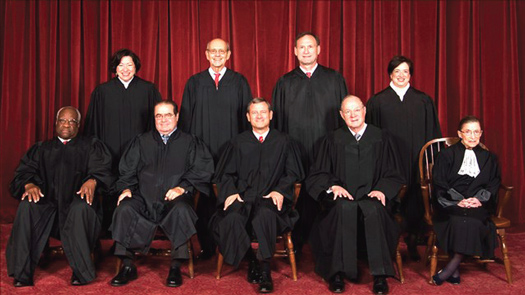By George E. Curry -Guest Columnist-

In arguably the most important civil rights case the U.S. Supreme Court will hear this term–a case that could ban or limit the consideration of race in public employment, government contracting and higher education–Clarence Thomas, the lone Black justice, was silent. Of the justices hearing the case, only Thomas did not utter a single syllable Dec. 9 during 1 hour and 35-minutes of oral arguments in Fisher v. University of Texas-Austin.

The University of Texas considers seven factors in its affirmative action program: demonstrated leadership qualities, extracurricular activities, honors and awards, essays, work experience, community service and special circumstances such as applicant’s socioeconomic status, family composition, special family responsibilities, socioeconomic status of applicant’s high school and race.
Fisher sued over race, claiming that considering race, even with other factors, violated the Equal Protection Clause of the 14th Amendment.
She sued even though the university said she was unqualified and would not have been admitted even if there had been no affirmative action program. She sued even though the 14th Amendment took effect in 1868 to protect newly-freed slaves, not unqualified Whites.
Her attorneys conveniently ignored that universities–except in percentage plan cases where students are admitted based solely on their class rankings–look at a variety of factors when admitting an incoming class.
In fact, one Black and four Hispanics with lower scores than Fisher were offered provisional admission under a UT summer program. So were 42 Whites. In addition, 168 Black and Hispanic applicants with scores identical to or higher than Fisher were denied admission to the summer program, according to a university brief.
Yet, one of Fisher’s staunchest backers is “Silent Clarence” Thomas, who is quiet on the bench, but has been a wrecking ball against affirmative action.
In their book, “Supreme Discomfort: The Divided Soul of Clarence Thomas,” Kevin Merida and Michael A. Fletcher, two colleagues at the Washington Post, wrote: “Every Thomas employer, from [Former Missouri Sen. John] Danforth, who gave him his first job, to President George H.W. Bush, who nominated him to the Supreme Court, chose Thomas at least partly because he is black. Race is a central fact of his meteoric rise, and Thomas has alternately denied it and resented it–all the way to the top.”
In every court case involving affirmative action, “Silent Clarence” has voted against it, including Texas v. Hopwood, Adarand v. Pena and Grutter v. Bollinger.
Although Justice Antonin Scalia was roundly criticized over his recent remarks about Blacks needing to attend “lesser” colleges, it was the same position espoused by Thomas in 2003 when the court upheld the University of Michigan Law School affirmative action program.
In his dissent, Thomas said, “… Nowhere in any of the filings in this Court is any evidence that the purported ‘beneficiaries’ of this racial discrimination prove themselves by performing at (or even near) the same level as those students who receive no preferences.
“… The Law School tantalizes unprepared students with the promise of a University of Michigan degree and all of the opportunities that it offers. These overmatched students take the bait, only to find that they cannot succeed in the cauldron of competition. And this mismatch crisis is not restricted to elite institutions.”
Thomas wrote, “While these students may graduate with law degrees, there is no evidence that they have received a qualitatively better legal education (or become better lawyers) than if they had gone to a less ‘elite’ law school for which they were better prepared …”
That’s quite a comment from someone who attended both Holy Cross College and Yale Law School under affirmative action.
In at least one respect, Thomas is worse than Scalia–he is the only justice who volunteered that Grutter should be overturned–even though Fisher isn’t seeking that resolution in her petition.
When the Supreme Court first heard Fisher two years ago, Thomas wrote, “I write separately to explain that I would overrule Grutter v. Bollinger, 539 U. S. 306 (2003), and hold that a State’s use of race in higher education admissions decisions is categorically prohibited by the Equal Protection Clause.”
While he wants to exclude consideration of race in almost all instances, he feels it is okay for universities to use alumni preference or legacy programs that favor privileged applicants whose parents have attended a certain university.
“The Equal Protection Clause does not, however, prohibit the use of the unseemly legacy preferences or many other kinds of arbitrary admissions procedures,” Thomas wrote in Grutter. “What the Equal Protection Clause does prohibit are classifications made on the basis of race. So while legacy preferences can stand under the Constitution, racial discrimination cannot.”
It’s not surprising that Thomas is known as the court’s cruelest justice.
The late U.S. Appeals Court Judge Leon Higginbotham observed, “I have often pondered how is it that Justice Thomas, an African-American, could be so insensitive to the plight of the powerless. Why is he no different, or probably worse, than many of the most conservative Supreme Court justices of the century? I can only think of one Supreme Court justice during the century who was worse than Justice Clarence Thomas: James McReynolds, a White supremacist who referred to blacks as ‘niggers.’”
This column was distributed by George Curry Media. Direct all inquiries to: [email protected].












